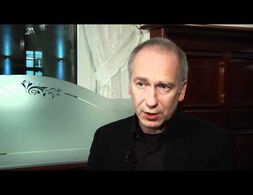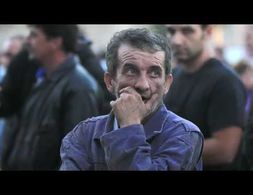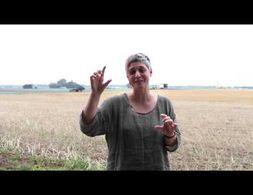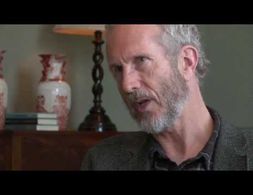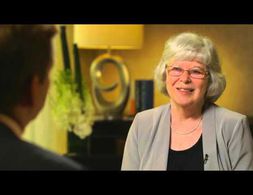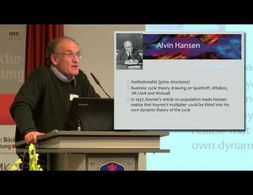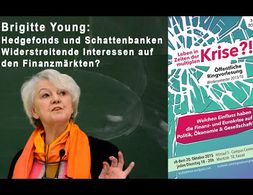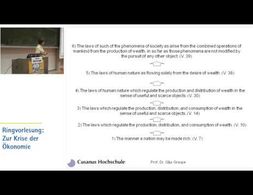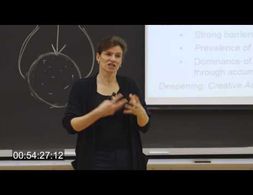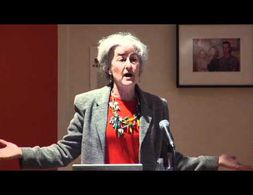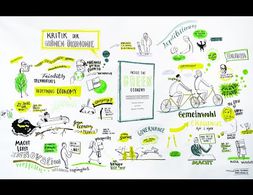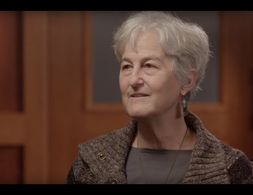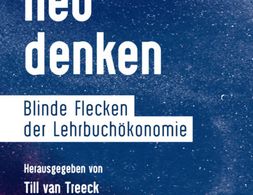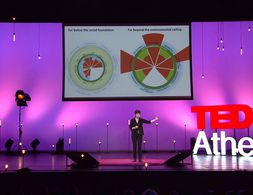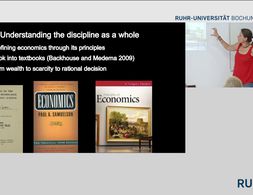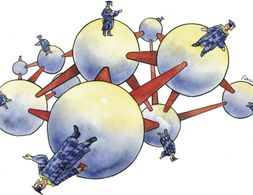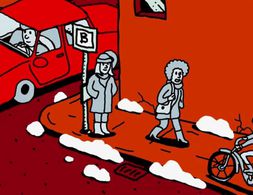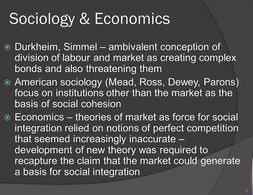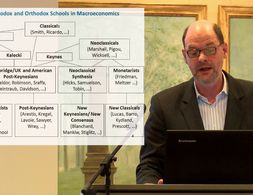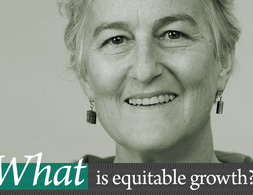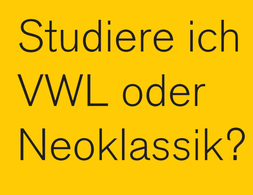1525 Ergebnisse
Was ist Utopie? Ist der Markt eine Utopie? Wofür dient der Markt und als was wird er wahrgenommen? Und ist die Wirtschaftswissenschaft eine Glaubenslehre? In diesem Interview wirft der Literaturwissenschaftler Joseph Vogl, Autor des Buches „Das Gespenst des Kapitals“, neue Sichtweisen und Überlegungen auf den Markt abseits von Gleichgewichten und Austauschprozessen auf.
Renowned scholars elaborate a critique on neoclassical economics and how it was unable to predict and even favoured the financial crisis. They refer to DSGE models, equilibrium theory and rational agents – a brief insight in the critique on neoclassic economics.
Barbara Muraca gibt eine Einführung in das Thema Degrowth, u.a. zu Grenzen das Wachstums - planetarischen aber auch sozialen Grenzen. Dabei spricht sie über Ausbeutung durch eine Verschiebung von Grenzen. Zudem stellt sie dar, wie die Degrowth Perspektive und die Klimagerechtigkeits-Bewegung zusammen passen.
Economist and 2020 Balzan Prize winner for Environmental Challenges: Responses from the Social Sciences and Humanities, Joan Martínez Alier, speaks on the importance of ecological economics and its timeliness around the 2007/2008 global financial crisis. He speaks on the importance of building the field of ecological economics “from the ground up” through praxis.
Based on a critique on econometric and DSGE models (in particular in the context of the financial crisis), Doyne Farmer presents his current research programme that aims at building an agent-based model of the financial and economic crisis. It models heterogeneous agents and from there simulates the economy, firstly for the housing market. The interview gives a short insight in the research programme.
Sheila Dow discusses the concept of radical uncertainty and the failure of neoclassical economics to integrate it into its analysis. As to the implications for financial regulation that arise from the presence of radical uncertainty she argues for institutional overhaul, where the banks see themselves as a licensed partner of the central bank and where rules, values, and conventions would be subject to a cultural shift. Also, Sheila Dow advocates for a renewed focus on retail banking.
In this keynote speech, Roger Backhouse gives a historical overview of theories on secular stagnation: how it evolved from a description of the economic situation, especially in the U.S. of the 1930s to an analytical tool and then lost importance until its current revival. Backhouse touches upon the contributions of J. A. Hobson, Alvin Hansen, Evsey Domar and Paul Samuelson.
Was sind Finanzmärkte, Hedgefonds und Schattenbanken? Über diese Fragen erläutert Brigitte Young die Funktionen von Finanzmärkten und Hedgefonds, sowie deren Dysfunktionen anhand prominenter Beispiele. Young geht zudem auf die Regulierung von Hedgefonds nach der Finanzkrise und den Zusammenhang zum Schattebankensystem ein. Zuletzt stellt sie die Frage, ob das Finanzsystem einen sozialen Nutzen hat.
In diesem Vortrag „Von der Neoklassik zum ökonomischen Mainstream“ entwickelt Silja Graupe „kritische Reflexionen zur Entwicklung modernen ökonomischen Denkens“. Was machst die Denkweise der „modernen Lehrbuchökonomie“ aus? Welche Konsequenzen hat diese und wie hat sie sich historisch herausgebildet?
What is innovation, what drives innovation and the process that differentiates firms? What is competition and what kind of dynamics lie behind the differences between firms and their innovative activities? Mariana Mazzucato elaborates on those questions from an evolutionary economics' and Schumpeterian perspective. The slides of her lecture are not visible, hence some visualizations can't be followed.
Feminist economist Nancy Folbre presents a historical analysis of the interrelated development of Patriarchy and Capitalism. She describes the role of women in the reproduction of labour, their “specialization” in care and their changing involvement in the labour market. Folbre argues that capitalism weakens patriarchy but at the same time relies on unpaid caring activities.
Das Panel erörtert das Konzept einer grünen Wirtschaft, stellt insbesondere Kritiken an der grünen Wirtschaft vor und spricht dabei problematische Aspekte einer grünen Wirtschaft an.
Die Vereine Konzeptwerk Neue Ökonomie und Fairbindung e.V. haben gemeinsam mit dem Webportal „Endlich Wachstum! Bildungsmaterialien für eine sozial-ökologische Transformation eine umfassende Methodensammlung aus über 100 Methoden veröffentlicht. Die Methoden regen auf vielfältige Weise dazu an, sich mit Bedingungen unseres derzeitigen Wirtschaftens sowie möglichen Alternativen zu beschäftigen.
What does political economy say about the global sugar production? Take a look at global trade regulations, intercountry inequalities, and the role of marketing.
In the inspiring interview on Economics of Care, Nancy Foblre takes a closer look to the consequences of the marketization of caring activities on those activities and on the societal organization of care. Folbre elaborates on how to value care and how this shifts the perspectives on living standards. She points to the fact, that caring activities are undervalued both in the market sphere and within the family and thereby questions the division between those spheres. Lastly, Folbre answers the question how to reteach Economics when accounting for caring activities.
„Wirtschaft neu denken“ umfasst 20 Rezensionen aktuell einflussreicher Lehrbücher und zeigt: Viele Standardwerke blenden wissenschaftliche und gesellschaftliche Kontroversen systematisch aus und stellen wirtschaftliche Zusammenhänge, die seit jeher in hohem Maße komplex und umstritten sind, als scheinbar objektive Gesetzmäßigkeiten dar.
This historic timeline presents economic events, economic thinkers and schools of thought from the 18th century until the 2007/2008 financial and economic crisis with short texts on the respective event or perspective.
This talk was given at a local TEDx event, produced independently of the TED Conferences. Economic theory is centuries out of date and that's a disaster for ...
Keynesianische Ökonomen kritisieren die angebotsorientierte Deutung der Krise. Sie argumentieren, dass die Exportdefizite heutiger Krisenländer die Kehrseite einer schwachen Binnennachfrage in einer Reihe von Ländern im "Zentrum" der Eurozone sind.
In this lecture, Beatrice Cherrier explains why it is worth to research the history of JEL codes. The changing relationship between theory and application and the rise and death of new economic topics in the XXth century through the successive revisions of the classification system economists use to publish, recruit and navigate their discipline.
Diese Vorlesung gibt einen ersten Einblick in die Komplexitätsökonomie.
This article makes a necessary connection between economics as an academic discipline and recent events surrounding sexual harassment in the workplace. To get justice, targets must show measurable harm: economists can help.
On this episode of the Hayek Program Podcast, Professor Roger Koppl talks with Hayek Program Research Fellow Solomon Stein about his research on experts, evolution, and the dynamics of epistemics, his career, and in what future direction(s) he thinks Austrian economics will go.
Snow removal, ambulance transport, and school performance -the film aims at illustrating the principles of gender mainstreaming through concrete examples.
In this short talk, Nicole Pepperell discusses Albert Hirschman's book "Rival Views of Market Society and Other Recent Essays". Among others, he discusses different conceptions of the characteristics and dynamics of capitalist societies.
This lecture by Prof. Dr. Eckhard Hein is part of the Introductory Lectures on Heterodox Economics at the 20th FMM Conference in 2016. It gives a good overview about where Post-Keynesian Economics can be located and what it is all about.
Happy International Women s Day This International Women s Day 2018 is an opportune moment to highlight prominent scholars of Feminist Economics As a subdiscipline of economics Feminist Economics analyzes the interrelationship between gender and the economy often critiquing inequities and injustices perpetuated by mainstream paradigms Work of this nature …
What is “equitable growth” and how do we measure it? A better understanding of equitable growth—and how to measure it—can improve our understanding, inform decisions and lead to better outcomes for all.
Social and Solidarity Economy (SSE) and Feminist Economics make a conjoint statement: The way we see the economic system has nothing to do with human beings nor those who have been surviving outside the market.
"Why information grows" by Cesar Hidalgo and the atlas of economic complexity. César visits the RSA to present a new view of the relationship between the individual and collective knowledge, linking information theory, economics and biology...
Ricardo Hausmann says the new industrial policy is an information revelation process about the state of possibilities, the nature of the obstacles and figuring out whether you can sort out the obstacles so that these new activities can take over.
Mit allerhöchster Wahrscheinlichkeit neoklassische Ansätze, denn diese dominieren das Studium der VWL heutzutage an den meisten Universitäten. Jedoch ist der Begriff 'Neoklassik' mittlerweile selbst zu einem Streitthema geworden. Verteidiger des Mainstreams verstehen Neoklassik zumeist eng und beziehen sich auf die ideengeschichtliche Entwicklung der allgemeinen Gleichgewichtstheorie (Jevons, Arrow und Debreu) sowie das Wachstumsmodell von Solow.
Wir nutzen Cookies. Klicke auf "Akzeptieren" um uns dabei zu helfen, Exploring Economics immer besser zu machen!

